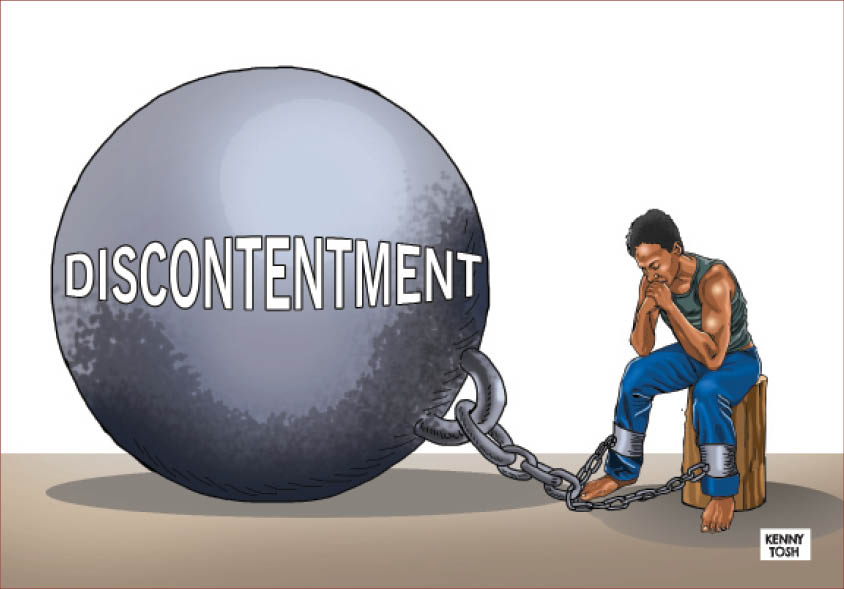Man’s heaviest burden
Discontentment is a burden and a ‘disease’ of the heart. It’s a negative trait associated with the Satan whose ungratefulness exiled him from the spiritual abode of Allah’s mercy. Satan’s refusal to obey Allah’s command and his consequent expulsion from the Garden of Bliss illustrates the corelation between arrogance, pride, and ingratitude on the one […]

M.U. NDAGI
Discontentment is a burden and a ‘disease’ of the heart. It’s a negative trait associated with the Satan whose ungratefulness exiled him from the spiritual abode of Allah’s mercy. Satan’s refusal to obey Allah’s command and his consequent expulsion from the Garden of Bliss illustrates the corelation between arrogance, pride, and ingratitude on the one hand and the consequences of being supercilious on the other. Discontentment is not strictly about being excessively materialistic. It actually transcends all spheres of human life including political, socio-economic, cultural and spiritual matters.
When Prophet Adam (AS) and his wife Hawwau were created, Allah made the heavenly Garden to be their place of residence; providing them with unrestricted access to food, drink, and everything that meant bliss. However, Allah warned both Adam and Hawwau to stay away from a particular tree and not to eat of its fruits. Unfortunately, Adam (AS) and his wife were both tempted by the envious Satan to eat from this tree. And so, Satan who is best described in the Qur’an as “the sneaking whisperer” muttered evil to Adam (A.S) and said: “O Adam! Shall I lead you to the tree of Eternity and to a Kingdom that never decays?” In the result, Adam (AS) and Hawwau both disobeyed Allah and thus ate of the tree and whence, their nakedness appeared to them. Allah (S WT) then asked both of them (as contained in Qur’an 20: 123) to get down to the earth from the Garden.
This was how Adam (AS), lost his tenancy in the Garden; all because of the seed of discontentment sowed by the Satan in in heart. Had Adam remained contented with the other fruits in the Garden and kept away from the ‘exempted’ tree as instructed by Allah, he wouldn’t have been brought down to this phenomenal planet, and no man would thus have experienced the complex troubles of a 21st century world. Discontentment, which marked the historical beginning of Adam’s problems, yet remains the root of contemporary man’s ‘headache’.
- First Lady welcomes rescued Chibok girl, to sponsor her education
- Niger crisis: Nigeria, Benin, Ivory Coast, Senegal commit troops as AU backs ECOWAS
It’s the wish of Satan, at all times, to mislead man into believing that material wealth can only sprout from discontentment. A mind under the spiritual influence of the Satan would always look at those who possess more in the ownership of properties, assets, estates or wealth generally. Such a person may never find contentment because Allah (SWT) has designed the natural scheme of things in such a way that, over every possessor of a particular favour is another. Man is urged to rather look at those lower to him in everything so as not to hold Allah’s favours in contempt. We must not use the physical abilities, wealth, health, knowledge, status or personality of others to determine how rich or poor, highly or meanly placed we are. Much gratitude lies in our ability to appreciate Allah’s bounties on those who have less or none at all. Contentment is tantamount to acknowledging the contrast between “the haves” on the one hand, and “the haves-not” on the other.
An ungrateful mind suffers from a variety of illnesses, one leading to another. These include emotional instability, materialism and greed. A dissatisfied mind perpetually remains unstable and restless because of the strong desire to achieve what another man has attained. Wild ambitions are bound to create psychological instability in discontented persons. Such a person is likely also over-stretch himself because of the tendency to be at the four corners of every activity lest he loses any chances. The ‘round-the-clock’ schedules he imposed on himself would gradually create unnecessary tension in him. Often, a mind that is unable to properly manage its ambitions is likely to tamper with the quality of one’s religious duties (obligatory and superogatory). A mind without contentment gives little attention to his religious obligations, which may not be accompanied with the desired spirit and concentration necessary for achieving piety.
Discontentment creates materialistic tendencies in every ungrateful person. And, if such tendencies are not regulated accordingly, it makes the person vulnerable to dupes and cheats. Majority of those who fall victims of scams are people who are materially over-ambitious. Similarly, discontentment inspires indulgence in everything that Allah has made unlawful including ribbah (usury), hoarding, fraud, etc; all in the attempt to making ends meet (if they would ever meet).
A contented mind is a peaceful mind. Contentment is a virtue and one of the many forms of showing gratitude to Allah, the most Beneficent. With contentment, one is able to build a personality of high integrity and reputation. A contented person earns a lot of respect from the society. He also becomes one of those that enjoy the love and mercy of Allah (SWT). A mind blessed with contentment is a mind blessed with piety.
No matter how bad our socio-economic is; no matter the how rich or poor we feel; and no matter the dictates of the realities of modernity; if we remain contented, Allah (S WT) has promised in Qur’an 14: 7 that He will not only improve upon our lots but will also add more favours to us. If, however, we take to discontentment, the Omnipotent is most severe in His punishments. Certainly, Allah loves those who are contented. It takes a lot of courage, sacrifice and sincere faith for one to attain contentment. May Allah enrich our hearts with contentment; leaving no space for the Satan to intrude with his army of discontented creatures, amin.
